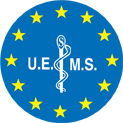Establishing an effective communication channels among all the actors involved in an emergency situation
![]()
HEALTH C (Improving Crisis Communication Skills in Health Emergency Management) is an EU-funded research project which aims to understand the challenges and solutions in crisis communication during health emergencies and is conducted by a consortium of European research partners (Aarhus Social and Healthcare College – Denmark, Artica Telemedicina – Spain, ASL Brescia – Italy, European Hospital and Healthcare Federation HOPE – Belgium, Inovamais – Portugal and Ludwig-Maximilians-Universität München – Germany).
Strengthening crisis communication and management capacities in health systems in the WHO European Region has become a major concern for the EU, especially taking into account the following recent global trends:
- An increasing number of health crises and disasters Growing social & economic losses – long term consequences for vulnerable societies;
- During the past 20 years, disasters have killed at least three million people; adversely affecting 800 million more;
- Health is a major concern and a priority in the crisis management.
On the other side, as showed in recent emergency situation, establishing an effective communication channels among all the actors involved in an emergency has been proved to be an important instrument to allow a quick and efficient response to the crisis situation. Guarantying a continue exchange of information among health authorities, population and media, using different communication channels (social networks, blogs, online magazines and other web portals) is essential to manage an emergency in the most effective way.
Based on these facts and emerging trends, there is a relevant need design a training course from a functional point of view focusing on different professionals' competencies and including a special focus on how to use new communication channels in an emergency situation. There's a real need to increase the competences of the health sector staff.
These training course will focus on how health authorities can improve the cooperation with the others actors involved in the emergency (normally the population and the media) in order to deal with the emergencies condition in the best and quickest way. Furthermore, the HEALTH C project will also seek to encourage the use by health authorities of different communication tools and channels (social networks, blogs, online magazines and other web portals) that are commonly used by the other actors involved in the emergency: population and media.
The specific objectives of the HEALTH C project are the following:
- Create new skills and news competencies in the area of communication in health crisis management;
- Raise the awareness of local health authorities on the use of new communication channels in the management of emergency situation;
- Involve general population and media in this crisis communication initiative in order to increase and improve their capacities of reaction in an emergency situation;
- Create different focus groups that will provide knowledge and feedback for the training contents;
- Design a training course from a functional point of view focusing on different professionals' competencies and including a special focus on how to use new communication channels in an emergency situation
In the framework of this project, a survey has been elaborated to improve the existing guidelines for health crisis communication in Europe. Based on the outcome of this survey a tool-kit and training materials will be created with an aim to support different national health authorities and health professionals in the EU to communicate effectively in health crises situations.
Should you wish to take part in the survey please use the following link: https://www.soscisurvey.de/healthc/?q=HealthC_EU
Disclaimer:This news arises from information provided by external entities to the UEMS. The information and views set out in this news are those of the author(s) and do not necessarily reflect the official opinion of the UEMS. Sole responsibility for this content lies with the author(s) and the UEMS cannot be held responsible for any use that may be made of the information contained therein.
- Links:
- healthc-project.eu
